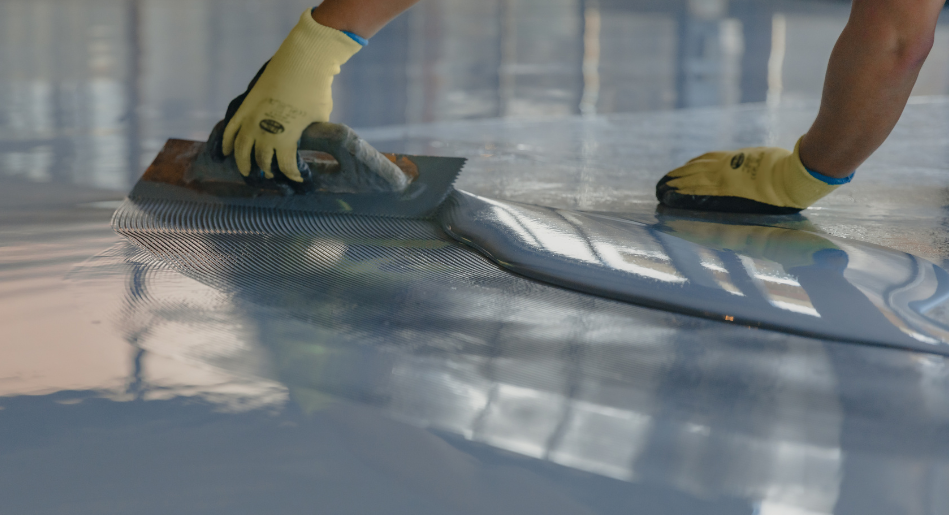
Epoxy flooring is an attractive and resilient floor coating option designed to protect basement floors from wear and tear. Furthermore, its easy maintenance makes it simple and stain-proof.
Standard application involves cleaning away dirt and oil from the concrete surface, filling cracks as necessary, etching to improve adhesion, and applying one coat of epoxy. A tinted base coat and optional stain-fighting flakes may also be included for additional stain-protection.
Water-based epoxy
Water-based epoxy flooring solutions provide an eco-friendly choice for concrete surfaces, free from volatile organic compounds that are harmful to both human and environmental health, no emissions of harmful radiations and low odor. Furthermore, its penetrating properties help consolidate concrete substrates - perfect for commercial, residential and industrial flooring applications alike.
When choosing an epoxy floor coating, it's essential to take into account how the surface will be used and its expected wear and tear. A garage floor may experience high traffic from parked cars and tools; for this reason it requires an extremely durable epoxy coating with chemical resistance and impact resistance features.
Water-based epoxy can be a good choice in areas requiring high durability, as it's easily cleaned. But 100% solids epoxy may provide greater strength.
100% solids epoxy is the strongest type of floor coatings, making it ideal for high traffic areas such as car garages and repair shops. It forms an impermeable barrier against water, salt, and oil reaching the concrete and corroding it - and hence lasts longer and offers greater durability than other floor coatings. However, its higher cost may make other forms more suitable.
Chemical-resistant epoxy
Before beginning to coat a basement floor with epoxy coating, the first step should be to sweep or vacuum thoroughly to remove dust, dirt and debris. After that, use degreaser on any oil or grease stains; and finally use an acid etching solution to increase adhesion of surface coating - this process should ensure even and consistent results from epoxy application.
Epoxy flooring is one of the toughest surfaces available, providing years of use with minimal maintenance costs and easy installation.
Epoxy floors are widely popular among industrial floors but can also be utilized in residential environments due to their durability. Epoxy floors resist impact, chipping and scratches as well as being capable of supporting heavy equipment weight. Furthermore, epoxy coating makes a fantastic choice for high traffic environments such as auto shops or factories.
Epoxy flooring also stands up well to moisture and vapors, unlike concrete which soaks up water and absorbs it, leading to mold, mildew, and other fungi causing damage in your home. Furthermore, epoxy is non-nutritious meaning it won't support bacteria or algae growth and makes an excellent option for garages as oil or gasoline spills won't have as detrimental an effect. Plus it's easily cleaned up allowing you to customize its appearance with colorful combinations, decorative flake finishes or even finishes giving your basement an eye-catching appearance!
Easy to apply
Many homeowners opt to apply epoxy floor coatings in their basement floors, making for an easy yet attractive and long-term surface. Prep work for applying this epoxy can be relatively straightforward: simply remove everything from the room, vacuum thoroughly and use non-corrosive cleaner or degreaser to remove oil and grease stains before using a non-corrosive cleaner to help the epoxy adhere better to concrete - use an etching machine equipped with a carbide diamond grinder to help create rough patches which the epoxy can bind better to.
Epoxy flooring is highly resilient and resistant to abrasions, chemicals, and heat damage, while remaining cost-effective relative to other flooring materials. Available in an assortment of colors and textures with anti-skid additives for safety and security features - you can purchase epoxy flooring at home improvement stores as well as online.
Water-based epoxy flooring is often chosen for basement floors due to its low odor and ease of cleaning with soap and water, as well as its ease of application and curing time (usually 24 hours). Solvent-based epoxy can be more challenging to work with and often requires the use of a respirator; regardless of which option is chosen, always ensure children and pets remain clear of its drying process.
Long-lasting
Epoxy floor coatings are known for being extremely resilient against impact damage and chemical exposure, lasting decades when properly installed and maintained. No cracking or chipping occurs with them and cleaning is simple. Furthermore, epoxy can often prove more cost-effective in the long run due to minimal repairs needed over time.
Before applying epoxy, it is essential to properly prepare the surface. This includes sweeping or vacuuming to remove dust, dirt and debris; using degreasers if necessary to eliminate oil or grease stains; as well as making sure your concrete slab is dry as epoxy will not adhere well on moist surfaces.
Once epoxy has been applied to your floor, it takes 48-72 hours for it to fully cure. Do not walk on or put any furniture on it until this period has elapsed.
Epoxy flooring can make for an excellent addition to any epoxy floor basement, as it's easily cleaned and maintained. Furthermore, epoxy's resistance against mold and mildew makes it a reliable barrier against these serious threats that often exist in basements - they pose structural damage as well as health risks for anyone walking across it! Epoxy protects these biological troublemakers as its structure does not provide food sources to these microbes that feed on its surfaces.
